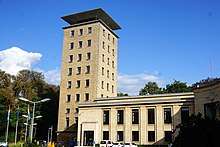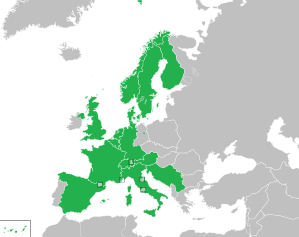Eurovision Song Contest 1962
| Eurovision Song Contest 1962 | |
|---|---|
 | |
| Dates | |
| Final | 18 March 1962 |
| Host | |
| Venue |
Villa Louvigny Luxembourg City, Luxembourg |
| Presenter(s) | Mireille Delannoy |
| Conductor | Jean Roderès |
| Directed by |
|
| Host broadcaster | Compagnie Luxembourgeoise de Télédiffusion (CLT) |
| Interval act | Achille Zavatta |
| Participants | |
| Number of entries | 16 |
| Debuting countries | None |
| Returning countries | None |
| Withdrawing countries | None |
|
Participation map
| |
| Vote | |
| Voting system | Ten-member juries awarded points to their three favourite songs. |
| Nul points | |
| Winning song |
"Un premier amour" |
The Eurovision Song Contest 1962 was the seventh edition of the annual Eurovision Song Contest, held on Sunday 18 March 1962 at the Villa Louvigny in Luxembourg. The contest was won for a third time by France with the song "Un premier amour", performed by Isabelle Aubret. This marked the first time a country had won three contests. Austria, Belgium, Netherlands, and Spain all scored "nul points" for the first time.[1]
Location

The 1962 Eurovision Song Contest was hosted in Luxembourg City. The venue chosen to host the 1962 contest was the Villa Louvigny. The building served as the headquarters of Compagnie Luxembourgeoise de Télédiffusion, the forerunner of RTL Group. It is located in Municipal Park, in the Ville Haute quarter of the centre of the city.[1]
Format
After France's entry had been performed, there was a short power failure rendering the screens dark. There also seemed to be an even shorter power failure during the Netherlands entry, when viewers around Europe only saw darkness on their television screens when the Netherlands performed. The power failure seemed to affect the Netherlands score during the voting. Nevertheless, the song turned out to be popular in Europe after the contest.[1]
Participating countries
All countries who participated in the Eurovision Song Contest 1961 returned for a second consecutive year, with no new countries making a début, nor any nations returning or withdrawing.[1]
Conductors
Each performance had a conductor who maestro the orchestra.[2]

.svg.png)
.svg.png)








.svg.png)




Returning artists
The contest saw the return of four artists this year, with three artists having previously participated in the 1960. Camillo Felgen for Luxembourg; François Deguelt for Monaco; and Fud Leclerc making his fourth appearance for Belgium, having also been present at the 1956 and 1958 contests. Jean Philippe, having previous represented France in 1959, returned to the contest as a representative for Switzerland.[1]
Results
| Draw | Country | Artist | Song | Language[3] | Place | Points |
|---|---|---|---|---|---|---|
| 01 | Marion Rung | "Tipi-tii" | Finnish | 7 | 4 | |
| 02 | Fud Leclerc | "Ton nom" | French | 13 | 0 | |
| 03 | Victor Balaguer | "Llámame" | Spanish | 13 | 0 | |
| 04 | Eleonore Schwarz | "Nur in der Wiener Luft" | German | 13 | 0 | |
| 05 | Ellen Winther | "Vuggevise" | Danish | 10 | 2 | |
| 06 | Inger Berggren | "Sol och vår" | Swedish | 7 | 4 | |
| 07 | Conny Froboess | "Zwei kleine Italiener" | German | 6 | 9 | |
| 08 | De Spelbrekers | "Katinka" | Dutch | 13 | 0 | |
| 09 | Isabelle Aubret | "Un premier amour" | French | 1 | 26 | |
| 10 | Inger Jacobsen | "Kom sol, kom regn" | Norwegian | 10 | 2 | |
| 11 | Jean Philippe | "Le retour" | French | 10 | 2 | |
| 12 | Lola Novaković | "Ne pali svetla u sumrak" (Не пали светла у сумрак) | Serbian | 4 | 10 | |
| 13 | Ronnie Carroll | "Ring-A-Ding Girl" | English | 4 | 10 | |
| 14 | Camillo Felgen | "Petit bonhomme" | French | 3 | 11 | |
| 15 | Claudio Villa | "Addio, addio" | Italian | 9 | 3 | |
| 16 | François Deguelt | "Dis rien" | French | 2 | 13 |
Scoreboard
| Voting results | ||||||||||||||||||
|---|---|---|---|---|---|---|---|---|---|---|---|---|---|---|---|---|---|---|
| Finland | 4 | 1 | 3 | |||||||||||||||
| Belgium | 0 | |||||||||||||||||
| Spain | 0 | |||||||||||||||||
| Austria | 0 | |||||||||||||||||
| Denmark | 2 | 1 | 1 | |||||||||||||||
| Sweden | 4 | 3 | 1 | |||||||||||||||
| Germany | 9 | 2 | 1 | 2 | 2 | 2 | ||||||||||||
| Netherlands | 0 | |||||||||||||||||
| France | 26 | 2 | 2 | 2 | 3 | 3 | 3 | 3 | 3 | 1 | 1 | 2 | 1 | |||||
| Norway | 2 | 2 | ||||||||||||||||
| Switzerland | 2 | 2 | ||||||||||||||||
| Yugoslavia | 10 | 1 | 1 | 2 | 3 | 3 | ||||||||||||
| United Kingdom | 10 | 3 | 1 | 2 | 2 | 2 | ||||||||||||
| Luxembourg | 11 | 3 | 3 | 1 | 1 | 3 | ||||||||||||
| Italy | 3 | 1 | 2 | |||||||||||||||
| Monaco | 13 | 3 | 1 | 3 | 1 | 2 | 3 | |||||||||||
| The table is ordered by appearance | ||||||||||||||||||
3 points
Below is a summary of all 3 points in the final:
| N. | Contestant | Voting nation |
|---|---|---|
| 5 | France | Germany, Norway, Sweden, Switzerland, Yugoslavia |
| 3 | Luxembourg | Belgium, Spain, Monaco |
| Monaco | Austria, Luxembourg, Netherlands | |
| 2 | Yugoslavia | France, Italy |
| 1 | Finland | United Kingdom |
| Sweden | Denmark | |
| United Kingdom | Finland |
International broadcasts and voting
The table below shows the order in which votes were cast during the 1962 contest along with the spokesperson who was responsible for announcing the votes for their respective country. Each national broadcaster also sent a commentator to the contest, in order to provide coverage of the contest in their own native language. Details of the commentators and the broadcasting station for which they represented are also included in the table below.[4]
Voting and spokespersons




.svg.png)








.svg.png)
.svg.png)

Commentators
|
|
References
- 1 2 3 4 5 "Eurovision Song Contest 1962". EBU. Retrieved 12 June 2012.
- ↑ http://www.andtheconductoris.eu
- ↑ "Eurovision Song Contest 1962". The Diggiloo Thrush. Retrieved 4 March 2012.
- ↑ "Eurovision 1960 - Cast and Crew". IMDb. Retrieved 5 March 2012.
- 1 2 3 4 5 6 Christian Masson. "1962 - Luxembourg". Songcontest.free.fr. Retrieved 2012-08-10.
- ↑ Roxburgh, Gordon (2012). Songs For Europe The United Kingdom at The Eurovision Song Contest Volume One: The 1950s and 1960s. UK: Telos. p. 295. ISBN 978-1-84583-065-6.
- ↑ Dyrseth, Seppo (OGAE Norway)
- ↑ Tchernia, Pierre et al. (March 18, 1958). 6ème Concours Eurovision de la Chanson 1962 [6th Eurovision Song Contest 1962] (Television production). Luxembourg: RTL, RTF (commentary).
- ↑ "Infosajten.com". Infosajten.com. Archived from the original on 18 July 2012. Retrieved 2012-08-10.
- ↑ "Nederlandse televisiecommentatoren bij het Eurovisie Songfestival". Eurovision Artists (in Dutch).
- ↑ Leif Thorsson. Melodifestivalen genom tiderna ["Melodifestivalen through time"] (2006), p. 40. Stockholm: Premium Publishing AB. ISBN 91-89136-29-2
External links
| Wikimedia Commons has media related to Eurovision Song Contest 1962. |

